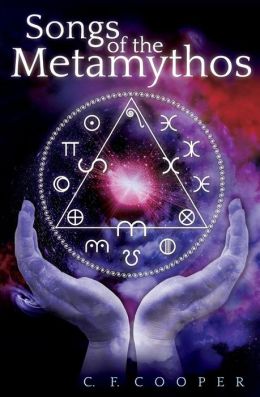Even in the new age of media, when a self-published book comes down a review pipeline, it often results in groans and games of assignment hot potato. C.F. Cooper got around this here at Facing North by having a cool looking website. The effort – and envy at having access to any designer with such skill – got the book past my email delete finger. As it turns out, Cooper has quite a resume that didn’t appear in any of the promo material including a decade writing for Marvel Comics. While in most situations, an author’s past has little relevance to me so long as the work is good, in this case it perhaps lent a little insight into Cooper’s peculiar opus.
Songs of the Metamythos tells the story of a universe. It tells the story of time. It talks about love and death, the grief of a mother, the grief of the barren, and about rage. Cooper writes with lyrical beauty – some passages made me pause to reread, just because of the transporting nature of the words. Unfortunately, something else also gave me pause: in between all this beauty of the universe lay a whole lot of chauvinism. Cooper’s story is certainly not misogynistic – the women characters all have powerful complexity, perhaps only one or two purely good or purely evil. The story does, however, hold a paternalistic and entirely too limited worldview of women. Despite being a “myth for the new millennium,” the women of the story seem to be limited to concerns borne of their bodies: fertility or lack thereof, marriage/lovers, and of course the fate of their children. The only agency demonstrated comes in a final villainous act of the character that represents Death.
Meanwhile, the male characters also fall into “men will be men” stereotypes of gods and heroes. These men abandon families without even trying to include them in the adventure, discover godhood by turning women to stone, and make the “radical” choice to marry two women at once – narrowly saving itself from the interchangeable women fetish by instead falling into the Madonna/Whore trap.
The plotting and characters frustrates even as the artistry of the language fascinates. As a woman with both autonomy and thoughts unrelated to my ovarian condition, the universe Cooper proposes looks like a lot of the same old entirely optional crap to me. Just because some folks might think what Cooper writes is the way it has always been does not mean that I buy for a single minute that it has to be that way.
~ review by Diana Rajchel
Author: Cooper, C.F.
Altair, 2014
pp. 241, $10.95
Songs of the Metamythos

©
2010 - 2025
Facing North
